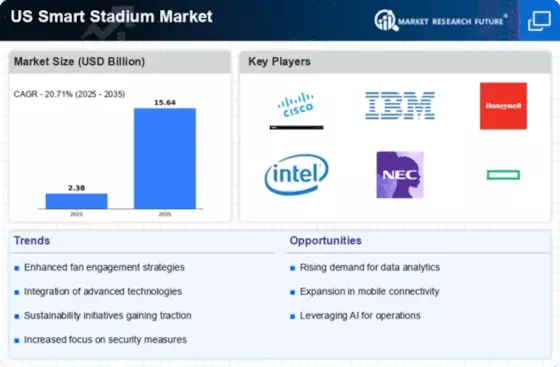Enhanced Security Measures
Security concerns are a paramount consideration in the US Smart Stadium Market. Recent incidents have underscored the need for advanced security protocols in public venues. Consequently, stadiums are increasingly investing in smart surveillance systems, biometric access controls, and crowd management technologies. Data suggests that the market for security solutions in stadiums is expected to grow significantly, driven by the demand for enhanced safety measures. This focus on security not only protects fans but also reassures stakeholders, including sponsors and event organizers, thereby fostering a more secure environment for all. The ongoing evolution of security technologies is likely to play a crucial role in shaping the future of the US Smart Stadium Market.
Technological Advancements
The US Smart Stadium Market is experiencing a surge in technological advancements that enhance the overall spectator experience. Innovations such as high-speed Wi-Fi, augmented reality, and mobile applications are becoming standard in modern stadiums. According to recent data, over 70% of stadiums in the US have implemented advanced connectivity solutions, allowing fans to access real-time information and interactive features. This trend not only improves fan engagement but also drives revenue through targeted advertising and sponsorship opportunities. As technology continues to evolve, the integration of smart systems for crowd management and security is likely to become more prevalent, further solidifying the role of technology in the US Smart Stadium Market.
Changing Consumer Preferences
Changing consumer preferences are reshaping the US Smart Stadium Market. Today's fans seek more than just a game; they desire an immersive experience that combines entertainment, technology, and convenience. This shift is prompting stadiums to adopt features such as mobile ticketing, cashless transactions, and personalized services. Recent surveys indicate that over 60% of fans prefer venues that offer seamless digital experiences. As consumer expectations continue to evolve, stadiums are likely to invest in innovative solutions that cater to these demands, thereby enhancing overall satisfaction. This trend not only drives competition among venues but also highlights the importance of adaptability in the US Smart Stadium Market.
Growing Demand for Sustainability
Sustainability initiatives are increasingly shaping the US Smart Stadium Market. With a heightened awareness of environmental issues, stadiums are adopting green technologies and practices. For example, many new stadium projects are incorporating energy-efficient systems, such as solar panels and rainwater harvesting, to minimize their carbon footprint. According to industry estimates, the market for sustainable stadium solutions is projected to grow by over 15% annually. This shift towards sustainability not only appeals to environmentally conscious fans but also aligns with broader governmental policies aimed at reducing greenhouse gas emissions. As a result, the integration of sustainable practices is likely to become a defining characteristic of the US Smart Stadium Market.
Increased Investment in Infrastructure
Investment in infrastructure is a critical driver for the US Smart Stadium Market. Recent reports indicate that public and private sectors are allocating substantial funds towards the development of smart stadiums. For instance, cities like Los Angeles and Atlanta have announced multi-million dollar projects aimed at upgrading existing facilities to meet modern standards. This influx of capital is not only aimed at enhancing the fan experience but also at ensuring compliance with safety regulations and sustainability goals. The anticipated growth in infrastructure investment is expected to create a ripple effect, stimulating job creation and economic development in the surrounding areas, thereby reinforcing the importance of smart stadiums in the US.
















